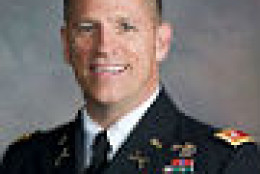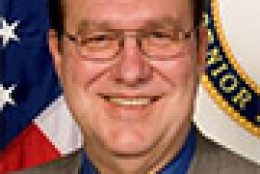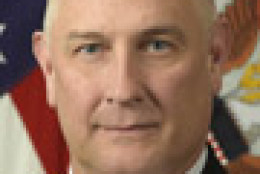Army
-
Big data success at the Army's Enterprise Management Decisions Support earns that team an honor. Lt. Col. Bobby Saxon receives the 2014 GOVTek GTRA Executive Technology Award for Excellence in Big Data. Saxon is system program manager for the EMDS. On In Depth with Francis Rose, he explained how big data will impact decision making in the military.
August 11, 2014 -
Move over MRE's, the Army is developing 3D food printers for soldiers in the field. If successful, soldiers will instantly have access to their food of choice by pressing the print button. The new technology could save money, avoid wasted food and give soldiers more food choices. Lauren Oleksyk is the food leader at the Army's Natick Research, Development and Engineering Center. She joined Tom Temin and Emily Kopp on the Federal Drive to discuss the new project.
August 08, 2014 -
A steady flow of policy documents details how the branches of the military -- and the Defense Department as a whole -- will prepare for the wars of the future. But the changing nature of warfare may have the United States preparing for the wrong war. Retired Army Lt. Gen. David Barno is senior fellow and co-director of the Responsible Defense Program at the Center for a New American Security. He was the first Commander of Military Operations-Afghanistan. He writes on War On The Rocks, under the title "The Shadow Wars of the 21st Century," that war is morphing. He explained how on In Depth with Francis Rose.
August 01, 2014 -
The Army says the alternative and renewable energy industry should not look to the military as a giant source of investment capital for new technologies. But there are a few exceptions to that rule.
August 01, 2014 -
The Army plans to say goodbye to more than 130,000 soldiers this year. To help troops move on with their lives the service is partnering with private employers who can provide job training. A new program will train some to enter the automotive industry. One of the partners is Raytheon. Lynn Dugle is president of Raytheon Intelligence, Information and Services. She joined Tom Temin and Emily Kopp on the Federal Drive to discuss the new program.
July 29, 2014 -
Congress has approved $8 billion for 26 inland waterway improvement projects. But, many of those projects won't be completed for another 50 to 60 years. The Army Corps of Engineers is looking to speed up the process through public private partnerships.
July 14, 2014 -
The technical name for one of the Army's communications networks is Warfighter Information Network-Tactical Increment Two. But some soldiers prefer to call it their digital guardian angel. Another calls it the holy grail of communication. Now one of the creators of the Army's WIN-T system is receiving prestigious recognition for his role in its creation. Patrick DeGroodt is Deputy Project Manager for the Department of the Army. He's a Service to America medal finalist in the National Security and International Affairs category. He explained the creation process on In Depth with Francis Rose. Read a Q&A with DeGroodt.
July 09, 2014 -
Among ten topics the Army's new undersecretary says he's pondering: the service's seeming inability to convince policymakers of the need to keep a standing active duty force of about the size the nation has today, even during budget cuts.
July 07, 2014 -
Lt. Gen. Robert Ferrell, the Army's CIO/G6, said the service now is requiring all enterprise software titles to be modernized, virtualized and migrated to an approved data center.
June 26, 2014 -
The debate to change the Army's force structure is switching focus from "should they do it" to "how." One strategy is a Commission on the Structure of the Army. Frank Hoffman, a senior research fellow at the Institute for Strategic Studies at the National Defense University, tells In Depth with Francis Rose a commission would be a big step backwards in the effort to make the Army more affordable.
May 30, 2014 -
It's been 23 years since the Tailhook scandal rocked the Navy, and the Pentagon is still struggling to eliminate sexual assaults from the military. The number of reported cases is on the rise, but is counting cases alone solving the problem?
May 20, 2014 -
The National Defense Authorization Act of 2014 rewrote the Uniform Military Code of Justice as it applies to sexual assault cases. Congress stopped short of stripping military commanders of their authority over the process, as many victims' advocates wanted. But it gave the military's legal corps more control over investigations and prosecutions. As part of our special report Trust Redefined: Reconnecting Government and Its Employees, Tom and Emily spoke with Col. Max Maxwell on The Federal Drive. He is the strategic initiatives officer for the Army Judge Advocates General Corps.
May 19, 2014 -
The Air Force does a 180 and now predicts it will meet the September and the 2017 financial management deadlines. Government auditors and Senate lawmakers agree the key to this effort is whether the Defense Department can upgrade and improve their track record in implementing ERP systems.
May 14, 2014 -
After more than a decade of high-tempo work aimed at getting equipment to the battlefield as quickly as possible, the Army official in charge of contracting says it's time for his workforce to slow down and think. Harry Hallock, deputy assistant secretary of the Army for procurement, tells Federal News Radio's Jared Serbu the Army took contracting shortcuts during wartime and not all of them were smart decisions.
May 13, 2014 -
The military has doubled-down on efforts to prevent sexual assault. They've labeled this month "Sexual Assault Awareness Month." It's a topic Sgt. Maj. of the Army Ray Chandler brings up whenever he visits soldiers. He says "Take back your Army" from those who commit sexual assault. Chandler told Federal Drive hosts Tom Temin and Emily Kopp some of the most recent statistics about sexual assault in the Army.
April 30, 2014












